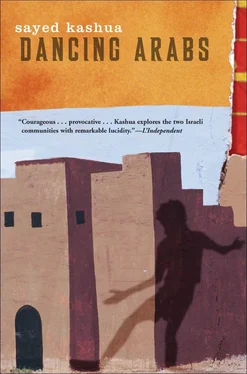In all his letters from prison, Father wrote to Grandma too. “Tell my dear mother” or “This is for my beloved mother” or “Tell the dearest person of all.” He usually sent the letters to his brothers-in-law, my aunts’ husbands. In all of them, he sounded all right — or at least as if he was trying to sound all right. In October 1969, in the oldest postcard I found, he said that the problems of adjusting to life in jail were behind him. There were people you wouldn’t usually have a chance to meet, and he got along well with them. In one of the letters, he told Uncle Bashir he was slowly turning into an abu-ali, a big shot.
In a later letter, after a sixth-month remand, he wrote about the wonderful library and said he spent all his time there, studying.
Tell my dear mother I’m very glad they gave me another six months. Tell her I asked them to, because there are books here that I haven’t had a chance to read yet. There are so many books, and I spend every minute in the library, except if someone asks me to play some chess. Please ask Mother to bring me an English-Hebrew dictionary from home.
When they prolonged his detention again, he wrote that five years wouldn’t be enough for him to finish all the books he’d listed for himself. He talked about the unusual opportunity he’d been given to purify his body and soul and to test his endurance and resolve. He knew now that he’d been born to be a prisoner. He could not imagine himself without the bars and the barbed wire.
Were it not for the fact that you and my sisters miss me, I would stay here forever. I like it here. The only thing that disturbs me is that you did everything you could in order for me to reach the top. I feel sad for every drop of perspiration you shed on my behalf. I know I’ve let you down. The only thing missing in my life now is the opportunity to make it up to you. I don’t know how.
In one of the papers that has turned completely yellow, the picture of my father is no more than a blur and I can hardly make it out. They don’t write anything interesting. Just his picture and his name with the caption: A third-year student. Judging by his grades in the first two years, it looks like he wasn’t particularly brilliant or diligent. He didn’t take too many courses. One of them was Nationalist Movements in Modern Times, with Professor Y. Talmon. It seems he didn’t put too much of an effort into his university career, just like me. When I dropped out, I was so ashamed of myself that I didn’t dare go home. But it didn’t occur to me to blow up the cafeteria.
My father was twenty-two when he was arrested. He thought at the time that he was twenty-three. Grandma kept a letter she had sent to the editor of Al-Quds. They published it under the heading RELEASE MY SON. She wrote that she was a widow whose husband had died twenty-three years earlier, leaving her with four daughters and a son. She’d done everything she could for them, her son was the very essence of her life, and she was asking the Minister of Police, the Minister of Defense, and the Prime Minister to release him. The headline of the story above the letter announced that the village of Arabeh would be hooked up to electricity in the course of 1970.
After that, Grandma went on a hunger strike, and father wrote another postcard to Uncle Bashir, urging him to make her stop. If he’d been suffering, that’s one thing, but he was really doing fine in jail. Genuinely fine. He was chess champion of his whole wing.
My father doesn’t talk about those days. All I know is what the papers reported or the things he himself wrote in his letters, which don’t explain much either. In 1971, the Council of Arab Students circulated a handbill denouncing the policy of administrative detentions and demanding that Father be put on trial or released immediately. It said the police had closed the cafeteria bombing case and all those involved had been tried.
I went to the Dead Sea once, with my grandmother. It’s good for you if you have aches in your legs. She asked her friend Amneh to sign me up for the trip too. Amneh was a tour organizer who specialized in trips for women, mainly older women her own age. Sometimes they’d go to the Hamat-Gader spa, sometimes to Jerusalem for Friday prayers. She organized trips to any place that could help people’s bones.
Grandma and Amneh had been friends all the way back, since the time of the Ingliz. Amneh’s husband had a gun that the English had given him to defend the village. One day when Amneh’s husband went indoors to sleep and left his gun beside him, Abu Ziad, that scoundrel, came inside and stole it. The English thought Amneh’s husband had sold the gun. Two soldiers held his legs up with a stick, and the officer struck the soles of his feet with a whip. They didn’t believe the gun had been stolen. They stripped him and whipped him across the back. His cries could be heard as far as the fields, and the whole village came running to see what had happened. Only when the English were about to shoot Amneh’s husband did Abu Ziad intervene and tell them he’d found the gun in the field. Liar.
Amneh looked like my grandmother: the same white dresses meant for outings, the same white scarf covering her head. They were the oldest women on that trip to the Dead Sea. The others were all younger. Every once in a while, my grandma pointed gently at one of them and asked Amneh, “Whose daughter is she? She’s sweet. Why isn’t she married?” The whole way there on the bus, the women kept playing the darabukka, singing, and dancing. One of them held the microphone and sang an Indian song from the movie Kurbani, which was a hit at the time. Everyone knew the words and sang along with her.
I walk in the middle, with Grandma holding my right hand and Amneh holding my left. They’re sorry they haven’t taken their walking sticks. The bus trip has tired them out, and it’s very hot. All the women have gone into the sea already, and we’re the last ones to reach the shore. A few of the girls are laughing at us, but Grandma and Amneh can’t see or hear from such a distance.
I don’t mind their laughing at us. I stick with the two of them. I love listening to their stories, things nobody else knows. They keep repeating the same ones. About how people shot themselves in the arm to avoid being drafted into the Turkish army to fight in their war. The Turks would take them far into the mountains, where there was snow, and they would die of the cold. Nobody made it back alive.
Grandma and Amneh remove their white dresses. They’re wearing less fancy white dresses underneath, the kind that can be worn in the water. And under those they have their sharwals. They walk haltingly toward the water, afraid of slipping. They decide to sit down on the stones and inch their way in. I sit in the middle, holding their hands and inching my way in too.
Once we reach the water, Grandma wants me to come in, but I stay where I am so I can see her and make sure she doesn’t get lost. I watch over her from a distance. I’ll go in afterward, when she’s out. Their white dresses float on the water and look like two parachutes. Everyone laughs. Me too. It’s the first time I see my grandmother in the water. I can picture her now, young and strong. I can picture her working in the fields.
Once people in the village would fall in love in the fields. Sometimes Grandma would tell me about how a man and a woman we knew had met in the wheat field, and how another couple would exchange glances by the well at the edge of the village. She herself never did things like that. When she was young, she rode a horse from Qalqiliya to Tira. She loved riding horses, and she dressed as a man, covering her head with a kaffiyyeh and galloping off. Two riders followed her for quite a distance, but they couldn’t catch up with her. They couldn’t believe it when they discovered the rider was a woman, but she brushed them off, yelled it was none of their business, and rode back home.
Читать дальше












